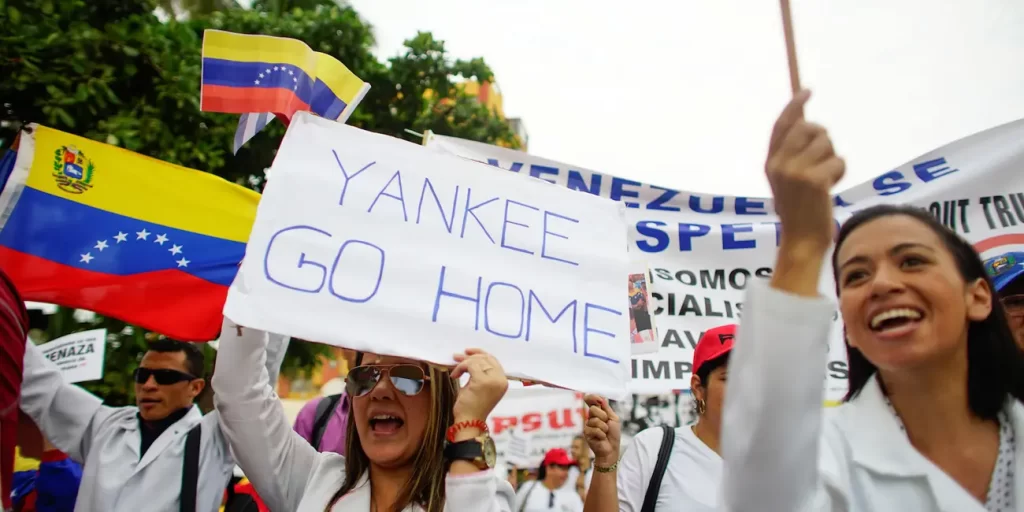Opposing US and UK sanction on Venezuela will remain a top international priority in 2023, writes Ken Livingstone
AS Venezuela enters the latter half of President Nicolas Maduro’s second term in office, the time is ripe for an overview of where the country currently stands, especially regarding ongoing attempts from the US and its allies (including the British government) to force regime change.
Since 2017, in pursuit of an anti-Maduro uprising in Venezuela, the US has levied an oil embargo, financial and secondary sanctions and a range of other measures targeting sectors such as banking, mining and food imports, amounting to a blockade akin to that imposed against Cuba since the 1960s.
As the blockade tightened, the impact on the lives of ordinary Venezuelans, particularly the poor, the sick and the elderly, became devastating, with far-reaching effects, leading to more than 40,000 deaths in 2017-18 alone. It was then cruelly extended at the time of the Covid pandemic.
But Venezuela has now survived the worst. 2022 has seen a continuation of the previous year’s trend towards greater political and economic stability. The success of Maduro’s party, the PSUV, in the November 2021 elections, provided a solid base for the government, capturing 19 of the 23 states and winning 212 of the 335 mayoral contests.
The government has also benefited from an overwhelming PSUV majority in the legislative assembly, providing a different footing on which to continue resisting the impact of the US sanctions and persistent aggression.
The PSUV’s success in the 2021 elections owed much to splits in the right-wing opposition. These have continued through 2022, although moves are afoot to settle on a single opposition candidate to challenge Maduro in the next presidential election scheduled for 2024.
The 10 largest right-wing opposition parties will hold primary elections in June 2023 to decide on their runner — but this candidate will not be Juan Guaido, the self-declared “interim president.”
2022 has seen Guaido’s US-backed project to topple Maduro run into the sand. Three of the four main parties of the opposition alliance, the Unitary Platform, now favour ending the “interim presidency” contrivance and ceasing to recognise Guaido as Venezuela’s “president in charge.”
US President Joe Biden is now also expected to ditch Guaido when domestic political conditions allow it, possibly in January 2023 when a new legislative session begins in Venezuela.
This is long overdue. Guaido’s record as “interim president” is one of the repeated scandals for corruption, links to drug traffickers in Colombia, involvement in serial coup attempts and recurring calls for a military coup.
A further nail in Guaido’s coffin has been the resumption in November this year of dialogue between the Maduro government and the right-wing opposition.
The dialogue had been suspended when the government withdrew from the process in October 2021 in protest against the kidnapping of Venezuelan diplomat Alex Saab in Cape Verde and his removal to the US to face charges of money laundering.
In late November, the resurrected process reached an agreement in Mexico that freed up $3 billion of Venezuelan funds that had been seized by the US, for spending on medical and social needs, to be managed by the UN.
At the same time, the US government granted Chevron a six-month licence to restart drilling and exporting Venezuelan crude oil.
Although the licence explicitly states that “other Venezuela-related sanctions and restrictions remain in place,” it has been welcomed by Maduro as “a step in the right direction” towards the complete lifting of sanctions.
These successes have been accompanied by a continuous improvement in Venezuela’s economic performance, despite the harsh impact of the blockade depriving the country of 99 per cent of its pre-sanctions income.
The upturn in economic performance reported early in 2021 has continued in 2022. Food security has been legally guaranteed for all, but particularly for the most vulnerable citizens; key public services have been maintained; the population has been protected from the Covid-19 pandemic better than in many far richer countries and 500,000 new social homes are expected to be built by the end of 2022.
Predictions for the rate of economic growth have ranged from 4 per cent to as high as 20 per cent by Credit Suisse. For 2023, estimates are around 6-7 per cent.
However, although Venezuela’s currency has been relatively stable since a monetary reconversion in October 2021, the economy is still prey to speculators, owing to the gap between the “official” exchange rate and a parallel, black-market rate. The Venezuelan Central Bank has recently had to spend a reported $190 million in an effort attempt to stop further devaluation.
Regionally, the electoral victories of Lula in Brazil and Gustavo Petro in Colombia, added to other supportive governments such as Mexico, Argentina, Bolivia and Honduras, have lent new weight to Venezuela’s resistance to the US.
Petro’s victory in Colombia is particularly significant, removing a hostile government from its western border, now reopened after years of right-wing Colombian governments supporting US plans for regime change in Venezuela.
But the US’s economic aggression and destabilisation attempts against Venezuela remain deep-seated — so campaigning against US sanctions and Britain’s continuing support for this drive to undermine Venezuela’s national sovereignty remains a key priority for all parts of the solidarity movement here.
The Latin America 23 conference takes place on Saturday January 28 in London — see www.latinamericaconference.co.uk.
This article originally appeared in The Morning Star

